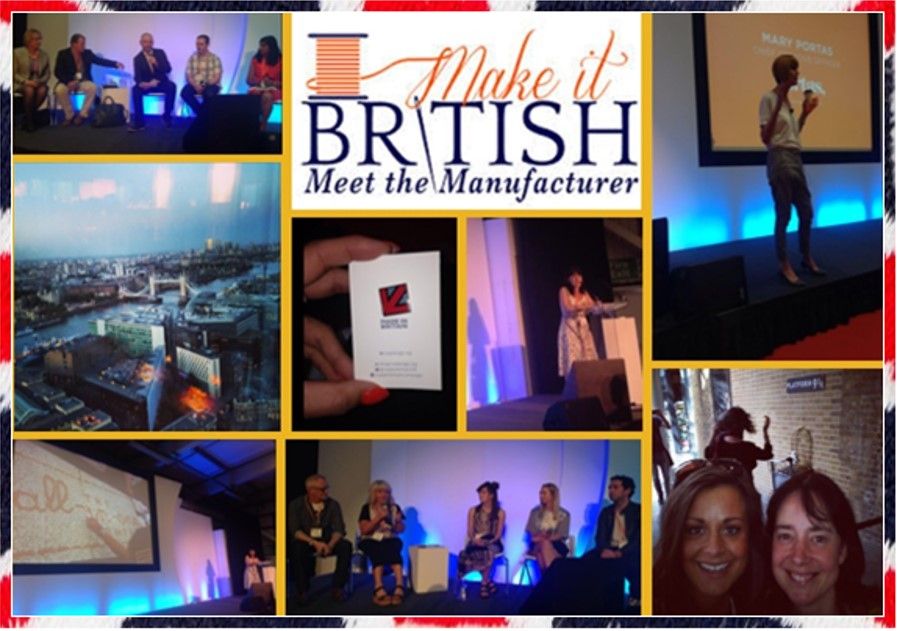Onesie Meet the Manufacturer Event
Posted on: 19/06/2014
Onesie - Beautiful British Buys

47 fashion and textile manufacturers and 26 leading industry speakers attended the first ever Meet the Manufacturer - Make it British event to help encourage the growth of British manufacturing. There were over 2000 visitors over the course of the 2 day event!
The show exceeded everyones expectations - some people even had to queue for over an hour to get into the show as the venue reached its capacity within minutes of opening.
It was estimated that around 600 people to visit over the 2 days, when in fact there was more than double the amount.
Kate, our company Director, was amongst the impressive line-up of guest speakers, including Mary Portas and Ian Maclean, MD of John Smedley - as you know, the oldest continuously operating factory in the world.
Kate, who set up The All-in-One Company without any previous experience in the industry, shared the story of her journey from start up, through set-backs, to a 1.2 million turnover. Each and every All-in-One onesie is designed by the customer on our interactive website, and handmade here in Northumberland, UK, by a highly skilled team, who are now experts in mass customisation.
"Through high performing team building and support from our local MP and College, listening to our customers and working with celebrities has enabled us share our journey of success and The All-in-One Company brand."
Kate Dawson, The All-in-One Company.
Mary Portas, key note speaker, opened day one with an inspirational speech, talking of her own experience of setting up a British made brand, Kinky Knickers. She spoke about how much hard work was put into the company, but that it was worth it to produce a great product and create British jobs.
She also shone light on the North East, as the papers and media tend to put it down;
"Competition time! Can anyone tell me which English region has a positive balance of trade? Name the region that exports more than it imports? Must be London surely – with all that service business and the City – it’s the economic powerhouse of Europe no? ...The correct answer is the North East.''British manufacturing is alive, it’s well, it’s kicking and it’s cool. Made in Britain stands for quality, value, ingenuity and pride”
Mary Portas
Steven Barr from the Manufacturing Advisory Service, explained the many ways that his organisation could help businesses improve their British manufacturing.
Tony Lutwyche, Founder, Creative Director and Executive Chairman of Lutwyche Holdings, shared his story from serving in the British Army to reinvigorating the face of English Tailoring. He said that even though the road had been long, he wouldn't change a thing.
A panel discussion then finished off the morning. Observer journalist Lucy Siegle, was joined by Jillian Bamsey (IDS), William Church (Joseph Cheaney & Sons), David Evans (Grey Fox Blog) and Sarah Ditty (Ethical fashion Forum), discussed the topic: what do the words Made in Britain mean to you? As it meant different things to different people, there was no distinct answer, however, as expected, the key themes were quality, craftsmanship and sustainability.
Jenny Holloway from Fashion Enter opened the afternoon session with an inspirational talk highlighting 'Stitching Academy' and their work with ASOS here in the UK. Ian Scott, Group Supply Director of Mulberry, described the challenges his company faced when staffing a brand new British factory. Mulberry partnered with Bridgewater College to design and manage a training process. The programme delivered over 300 skilled workers, many of whom were previously long-term unemployed.
Daliah Simble from Roland Mouret picked up on the fact that head offices frequently lack the skills to manage British production. Jobs like Production Manager fell away in the rush offshore, resulting in a severe recruitment shortage today.
The day was ended with yet another insightful panel discussion on the challenges and opportunities of making it British. The topics discussed included; red tape, lack of capacity, and clear evidence that consumers worldwide do indeed place a premium on products made in Britain.
Ian Maclean, MD of John Smedley, a knitwear firm operating since the 18th century, gave day 2 a fabulous start with his talk that highlighted the risks and rewards of e-commerce. Worldwide price transparency creates downward pressure on price. On the other hand, the web gives brands like John Smedley a direct route to customers, cutting out the commissions and margins taken by various middlemen and shared his view on the importance of UK manufacturers uniting together to become a stronger voice.
Journalist and ex-tabloid editor, Eve Pollard, spoke about the difficulties she faced setting up Eve Pollard Designs, which produces affordable dresses for mature women. Eve mirrored Mary Portas, and other speakers, in a campaign to get Government and media to better support British manufacturing.
Simon Middleton, one of UK's best known brand strategy advisors, shared his story behind the inspiration leading to The Great British Banjo Company and how the Shackleton banjo is made in Norfolk, UK. Like us, Simon defied critics who told him it couldn't be done and built his company around the inspiration he got from the legendary Ernest Shackleton.
Alongside Debra Hepburn (Young British Designers), Simon then joined a panel debate on the subject of 'What makes a great British brand?' Amongst the panel were Harriet Barford and Polly Wilkinson, two young designers who have established a successful international wholesale platform stocking their brand, Draw in Light, predominantly with independent boutiques. The panel agreed of the importance on telling your story - your story being the series of events which makes your brand what it is today.
Daniel Harris, the man behind the London Cloth Company, spoke of his experiences of 'How to Build a Cloth Mill in Half a Million Easy-to-Follow Steps.' Daniel set up a mill in East London with no training or prior knowledge of weaving. The factory is filled with old looms rescued from around the country which have been reassembled and repaired in his workshop. He is now fulfilling woollen fabric orders for high profile brands like J.Crew.
Many questions were raised during the conference about how best to work with British factories. The final panel debate addressed this critical issue head on. It soon became clear that, as with any relationship, communication is key.
Kate said, “Meet the Manufacturer was an outstanding event – I’ve met so many fantastic people who I can relate to, and I no longer feel isolated in this industry.
“I feel so proud to have been a part of this landmark event and hope that I have inspired others to follow in my footsteps and make a commitment to British manufacturing – as together we can save the knowledge and skills that are vital to this industry before it is too late.”
